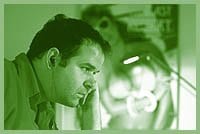Thom Fitzgerald’s new film has gypsies, beggars, pornographers, diplomats and lots of dogs. The one thing he says The Wild Dogs doesn’t have is gay content.
“Unless maybe some of the dogs are gay,” muses the director.
Fitzgerald’s highly-acclaimed 1997 debut, The Hanging Garden, about the return of a gay man to his rural Maritimes family – which he wrote and directed – attracted a lot of attention and prizes in Canada and around the world. The following year, Beefcake, his second feature about a young man working in the clandestinely gay “physique” magazine and photography industry in the ’50s, enjoyed a successful theatrical run in the US.
Fitzgerald, a resident of Halifax, is back with his third feature, The Wild Dogs, which premieres at the Toronto International Film Festival on Tue, Sep 10.
The film takes place in Bucharest, Romania over the course of a week, and tells the story of a reluctant dog-catcher, played by Romanian Mihai Calota, a bored ambassador’s wife, played by Alberta Watson, and a visiting Canadian pornographer, played by Fitzgerald, who become involved in the struggles of the city’s abandoned children, gypsies, beggars and wild dogs.
“It’s one of these films that has four or five concurrent stories happening, in the vein of PT Anderson or Robert Altman,” he says on the phone from Halifax. “They don’t all necessarily cross paths, but what ties them together is the setting and, of course, the dogs.”
Bucharest is over-run with a population of more than 200,000 wild dogs. When the communist dictator Ceausescu was in power in Romania, he was responsible for tearing down most of the houses in the city to build apartment blocks for the working class. Tenants were not permitted to bring their animals, so some 2,000 dogs were put out onto the streets at the same time about 20 years ago, and the population exploded. Last year, the mayor decided it was time to catch all the dogs and slaughter them.
Fitzgerald was inspired to write The Wild Dogs after having worked on an American TV movie filmed in Bucharest.
“Several of the actors in this film are gypsies and beggars who I befriended during my stay,” he explains. “I thought that their lives were dramatic and heroic enough to merit a movie. There has been very little national cinema since the fall of communism in Romania, so it was a chance for me to put a voice and a face on people who have very little chance to talk to the world.”
The film was shot on a small digital video camera, which gives the film a documentary feel, and which allowed the cinematographer to do things that could never be accomplished on 35mm, like following one stray dog all night long, or walking into an orphanage and improvising with hundreds of children.
“Some of the shooting was really tough,” recalls Fitzgerald. “Whenever we got a location permit, the police would know where we were and would come to get a bribe, or try to shut us down.”
Fitzgerald’s next film – called The Event – should at least be an easier shoot. It’s an ensemble film about the family and friends of a man with AIDS, played by Don McKellar. The cast also includes Olympia Dukakis, Sarah Polley, Brent Carver and Parker Posey, and will be finished in January 2003.
The Wild Dogs screens Tue, Sep 10 at 9:30pm at the Isabel Bader Theatre (93 Charles St W) and on Thu, Sep 12 at the Cumberland (159 Cumberland Ave). Single tickets are available for $13.75 in person only at the box office, in the Eaton Centre, level one at Dundas St. Same day tickets can be purchased at the cinema box office one hour before the screening for $14.

 Why you can trust Xtra
Why you can trust Xtra


